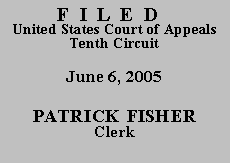

| SAMUEL MARION PONDER,
v.
HASKELL HIGGINS |
No. 04-6386
(D.C. No. CIV-04-1159-C) |
Petitioner-Appellant Samuel Marion Ponder, proceeding pro se, moves for a Certificate of Appealability ("COA") pursuant to 28 U.S.C. § 2253(c) in order to challenge the district court's denial of his 28 U.S.C. § 2254 petition for habeas relief. Ponder also moves to proceed in forma pauperis on appeal. We GRANT Ponder's motion to proceed in forma pauperis, DENY the COA, and DISMISS Ponder's appeal.
After a jury trial in Oklahoma state court, Ponder was convicted in 2002 of the offense of Trafficking in Illegal Drugs and was sentenced to eleven years' imprisonment. His conviction was affirmed on direct appeal.
In his § 2254 petition, Ponder alleges that (1) the jury was erroneously instructed on the proper range of punishment for the drug-trafficking offense; (2) the trial court violated his Fourth Amendment rights by admitting evidence obtained in a search of his clothing during a traffic stop; and (3) the prosecution did not sufficiently establish the chain of custody for the illegal drugs admitted into evidence at his trial, and his trial counsel provided constitutionally ineffective assistance by failing to challenge the adequacy of the prosecution's proof concerning the chain of custody.
In an accurate and well-reasoned Report and Recommendation, Magistrate Judge Gary M. Purcell, to whom Ponder's petition was referred, recommended that Ponder's petition be denied. After de novo consideration of Ponder's objections to that Report and Recommendation, the district court adopted the magistrate judge's recommendation and denied Ponder's petition. Ponder appealed the district court's determination to this court.
In his appeal, Ponder realleges his illegal search and chain-of-custody arguments. For substantially the reasons stated by Magistrate Judge Purcell in his October 27, 2004 Report and Recommendation, we DENY Ponder a COA and DISMISS his appeal. Ponder simply cannot establish that "reasonable jurists could debate whether (or, for that matter, agree that) the petition should have been resolved in a different manner or that the issues presented were adequate to deserve encouragement to proceed further." Slack v. McDaniel, 529 U.S. 473, 483-84 (2000) (quotations omitted).
ENTERED FOR THE COURT
David M. Ebel
Circuit Judge